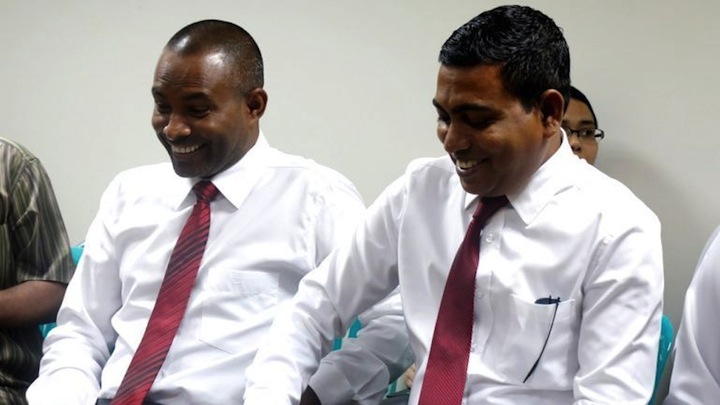The promotion of two criminal court judges who presided over the widely criticised sentencing of ex-president Mohamed Nasheed to 13 years in jail has raised concerns of corruption and executive influence over the judiciary.
Judges Abdulla Didi and Sujau Usman were appointed to the High Court on Monday, just ten days after the Supreme Court overturned a High Court ruling, which had noted several flaws in the new regulation on selecting judges to the appellate court.
The High Court took issue with the awarding of points on educational qualification and work experience, and with the final secret vote among Judicial Services Commission members to decide appointees.
Minivan News’ attempts to clarify the educational qualifications of Judges Didi and Usman, or the outcome of the evaluation of candidates were unsuccessful.
The High Court said it had not yet received information of the two judges, while Latheefa Gasim, the only JSC member who responded to calls, said the ten-member commission will have to make a decision on the issue.
Minivan News understands that Didi and Usman hold degrees in Islamic Shari’ah and law, a two-year accelerated degree course established at the College of Islamic Studies specifically for judges without higher education.
Usman, who had previously served as a magistrate judge in Gaaf Alif Villingili had been accused of corruption in 2010 for reportedly pocketing MVR 56,600 ($3670) for travel expenses he had not made. The criminal court in the same year dismissed charges.
President Nasheed’s lawyers in a statement yesterday said Didi and Usman’s transfer is a “blatant attempt to strengthen President Abdulla Yameen’s grip over the judiciary.”
Foreign governments and international bodies, including the UN, have noted the criminal court did not give Nasheed adequate time to prepare a defence, barred him from calling defence witnesses, and at times, denied him legal representation.
The pair’s transfer comes at a time when the government has insisted Nasheed must appeal his 13-year jail sentence at the High Court. But lawyers maintain the government has blocked them from filing an appeal.
Didi, Usman and Judge Abdul Bari Yoosuf also sentenced ex-defence minister Mohamed Nazim to 11 years in jail on weapons smuggling charges. The retired colonel has filed an appeal, the high court has said the pair will not oversee the appeal.
Hassan Fiyaz, a lawyer who contested the JSC regulation to appoint high court judges said: “I am concerned over the regulation as well as the selection of the judges. I believe there are qualified lawyers or judges in Maldives. But there are no chances for them here to work in judiciary.”
Other candidates who had filed for the two vacant positions are: civil court Judge Mariyam Nihayath, who holds a masters in law from a U.S. university; Aishath Rizna, the UNDP’s assistant representative who also holds a masters degree from a U.K university; Hussain Mazeed, who holds a degree from a Malaysian University; and Aishath Sujoon, a former civil court judge who holds a masters degree from an Australian university. Sujoon withdrew her name later.
A prominent lawyer, who wished to remain anonymous, also objected to the JSC drawing up new regulations for new appointments.
“This time they’ve favored people with experience more. They also drew up a new regulation, which for me, raises the possibility the JSC wanted specific people to elected,” they said.
The JSC’s new regulation awarded block 30 points to candidates with ten years of experience as a judge.
Some critics said the criteria does not differentiate between judges who have more experience. Others said the criteria does not do justice to the relatively young, but highly qualified people in the legal sector.
Another lawyer, who represents clients at the high court, said: “We need highly qualified people who can do complex research for cases. We can’t do research in Dhivehi. So a judge, especially a High Court judge should be fluent in at least English or Arabic. I believe Didi and Usman do not have that basic qualification.”
The High Court said the criteria appeared to grade candidates on the title of their degrees. For instance, a candidate who had a combined degree in Islamic Shariah and Law received 25 points, while candidates who had done a degree in law would receive 20 points, even though the latter may have studied the same number of modules in Islamic Shar’ah as the former.
The High Court also noted an individual who had done a degree in common law or Islamic Shariah, and held a masters, would receive 25 points, the same as an individual who had just done a degree in Islamic Shariah and common law.
Photo by Vnews. Published with permission.


